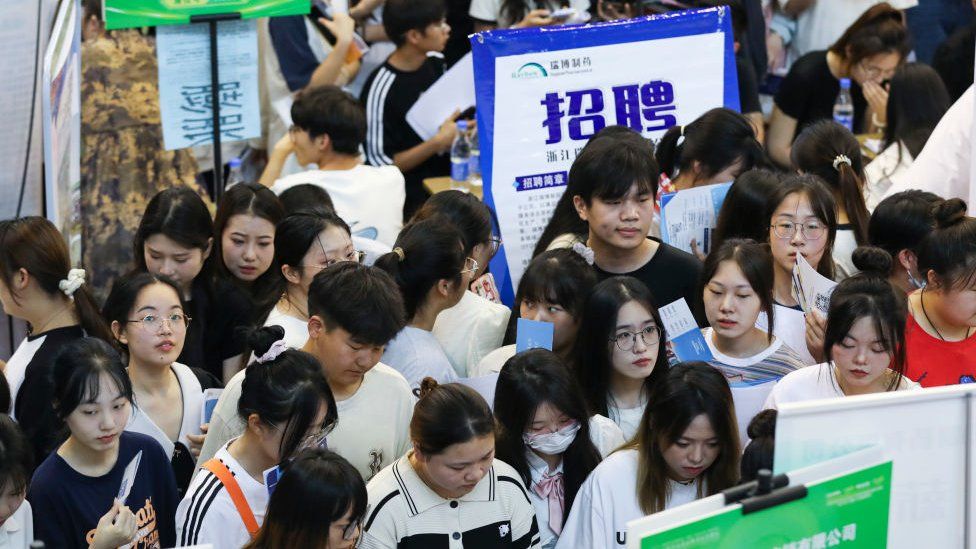Burnt out or jobless – meet China’s ‘full-time children’

Overworked and exhausted, Julie gave up her job as a game developer in Beijing this April to be a “full-time daughter”.
The 29-year-old now spends her day washing dishes, preparing meals for her parents, and doing other household chores. Julie’s parents pay for most of her daily expenses but she has refused their offer of a monthly wage of 2,000 yuan ($280; £215).
Her current priority, after all, is to get a breather from the 16-hour days in her previous job. “I lived like a walking corpse,” she said.
Gruelling work hours and a dismal job market are forcing young Chinese to make unusual choices.
Julie is part of a growing cohort that call themselves “full-time children” who are driven back to the comfort of home either because they are craving a break from their exhausting work lives, or they simply cannot find a job.
Young Chinese, who had always been told that the hard work they put in studying and chasing degrees would pay off, are now feeling defeated and trapped.
More than one in five of those between the ages of 16 and 24 are jobless in China, and the youth unemployment rate has been reaching new highs. According to official figures released on Monday, that figure now stands at 21.3% – the highest since authorities began publishing data in 2018. The figure does not account for the rural labour market.
Many of the so-called “full-time children” say they intend to stay at home only temporarily – they see it is a period to relax, reflect and find better jobs. But that’s easier said than done.
Julie has sent more than 40 job applications to recruiters in the past two weeks – but she has only got two interview calls. “It was hard to find a job before I quit. After I quit, it got even harder,” she says.
Burnt out, jobless or stuck?
The burnout driving working adults to become “full-time children” is not entirely surprising given China’s notoriously poor work-life balance – work culture in the country is often referred to as the so-called “996” – where people consider it a norm to work 9am to 9pm, six days a week.
Chen Dudu, also a “full-time daughter”, left her job in real estate earlier this year as she felt increasingly burnt out and under-valued. The 27-year-old said she “barely had anything left” after paying for rent.
When she was back at her parent’s home in southern China, Ms Chen said she “lived the life of a retiree” but anxiety has been creeping up on her. She says she kept hearing two distinct voices in her head: “One is saying, it’s rare to have this leisure, so just enjoy the moment. The other is urging me to think about what to do next.”
Ms Chen, who has since started her own business, said: “If that went on for a long time, I would indeed have become a parasite.”

Jack Zheng, who recently left Chinese tech giant Tencent, said he had to respond to nearly 7,000 work-related text messages outside work hours each day – the 32-year-old calls this “invisible overtime work” because while it was expected it was not compensated. He finally quit after the stress from work left him with a bad case of folliculitis, a skin disorder caused by inflamed hair follicles.
Mr Zheng has since found a better job, but he said people around him are not as fortunate. Many also face the so-called “curse of 35”, a widely prevalent belief in China that employers are less willing to hire workers older than 35 – instead they prefer young people who are “less expensive”.
This double-edged sword of age discrimination and bleak job opportunities is a challenge for those in their mid-30s who have a mortgage over their heads, or are thinking of starting a family.
The despair is no less among university students, so much so that some have resorted to failing their examinations just to delay graduation.
In recent weeks, Chinese social media has been flooded with atypical graduation photographs that speak to fresh graduates’ disillusionment. Some show young people “lying flat” in graduation gowns, faces covered with mortarboards; others show them holding their graduation certificates above dustbins, ready to bin them.
University was once an elite pursuit in China. But between 2012 and 2022 enrolment rates rose from 30% to 59.6% as more and more young people came to see college degrees as a ticket to better opportunities in a competitive job market. But aspirations have given away to disappointment as the job market tanks. Experts say youth unemployment is likely to worsen as a record 11.6 million fresh gradates enter the market.
“The situation is quite bad. People are tired and many are trying to opt out. There is a lot of despair,” said Miriam Wickertsheim, director at Shanghai-based recruitment firm Direct HR.
China’s slower-than-expected economic recovery post Covid is a key reason for the high unemployment, says Bruce Pang, chief economist for Greater China at Jones Lang LaSalle.

Some employers are also less willing to hire “blank paper” graduates who have less work experience than their predecessors because of sustained Covid lockdowns, Mr Pang said.
China’s recent crackdowns on industries popular among young Chinese professionals have also choked the job market. Regulations against major tech companies, restrictions on the tutoring industry and and a ban on foreign investment in private education have all led to job cuts.
‘Slow employment’
While China’s government is well aware of these problems, it has tried to downplay them.
In May, Chinese leader Xi Jinping was quoted on the front page of the Chinese Communist Party’s People’s Daily newspaper, urging young people to “eat bitterness”, a Mandarin expression that means to endure hardship.
State-run media, meanwhile, has taken it upon itself to redefine unemployment. An editorial last week in the state-run Economic Daily used the term “slow employment” – while some young Chinese are indeed unemployed, the paper said, others have “actively opted for slow employment”.
The origin of the phrase is unclear but a 2018 article by China Youth Daily said that a growing number of university graduates were taking their time to find jobs, many choosing instead to travel or take up short teaching stints – this, the Chinese were told, was “slow employment”.
This time the definition includes those who haven’t found a job, or choose to continue education, learn new skills or take a gap year. No matter how hard the job market is, the paper advised people, they must “take action and work hard” – and as long as they do that, they don’t need to worry about being jobless.

Given the current state of the job market, however, the phrase and the advice has been far from well-received – some marvelled at their government’s “refusal to acknowledge the unemployment situation”, while others reacted with sarcasm.
“Chinese writing is so profound,” wrote one user on China’s Twitter-like service Weibo. “We are obviously unemployed, yet [officials have] invented the term ‘slow employment’. How slow would it be? A few months or a few years?”
Another user on Xiaohongshu, China’s equivalent of Instagram, said the term “pushes the responsibility on the young people all of a sudden”.
“Based on this explanation, the employment rate during The Great Depression in the US in the late 1920s should be 100%, as most people were in slow employment. What a way to resolve a global problem!”
“Unemployment is unemployment. We should call it what it is,” said Nie Riming, a researcher at the Shanghai Institute of Finance and Law.
“There may indeed be young people who would like a sabbatical before starting their next job, but I think the vast majority of those unemployed today are desperate for a job but cannot find one.”











